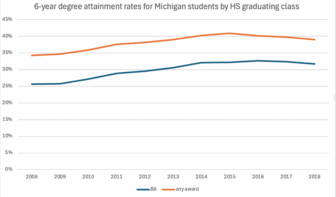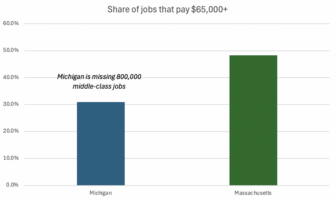Hal Wolman, formerly of Wayne State, now at George Washington, was in town this week. He is working on a national project to try to figure out what characterizes resilient regions – those that recover from big economic shocks.
I participated in a meeting he convened of a small group of “old hands” on the Michigan economy. Most of us – including Hal – had worked together on crafting the basic economic development plan of the Blanchard Administration.
Its interesting the common ground we share on the Michigan economy and what can be done by state, regional and local leaders to fix it:
1. The reason Michigan looks different than the nation today and for the past ten years is the same reason Michigan has looked different that the nation for a century: the domestic auto industry. When it does well Michigan does better than the nation, when it slumps, Michigan does worse than the nation.
What is different this decade is the domestic auto industry slumped in a national expansion and then collapsed in a severe national downturn. So Michigan for the first time ever lost jobs in a national upturn and it is now clear that unlike past national recoveries the auto industry will not lead us back to prosperity. The days of a high prosperity Michigan anchored by the domestic auto industry are over!
2. State, regional and local economic development policies are basically irrelevant in explaining the mess we are in. Nor does it matter which party the Governor is from or controls the state legislature. Turns out state and local economic policies are a weak lever at best.
As an example both the Blanchard and Engler administrations – who pursued quite different economic policies – presided over recoveries for part of their terms, but then downturns. Same policy was in place during upturns and downturns. And the different policies between the two produced basically the same results.
3. The key characteristic of resilient states and regions in the future will be human capital. The talent of its citizens. This is the asset that matters most in an increasingly knowledge-based economy. The skill, creativity and entrepreneurship of residents. Michigan’s fundamental challenge is that we are thirty fourth in education attainment.
4. Since talent is mobile – basically can live anywhere they want – creating places where talent from anywhere on the planet wants to live matters most to the future prosperity of the Michigan economy. And what matters most are amenities. Things like natural resources (a real Michigan advantage if we take care of them), vibrant central cities, good schools (k-16), the arts, transit, biking/walking friendly and parks and outdoor recreation. Not the normal priority list on how to grow an economy, but now what matters most.
The answer from candidates that matters most for our economic future is “what does Michigan need to look like for your kids (or grandkids) to live here after they graduate from college?” Because when they and their peers leave Michigan after college – as far too many are – they are taking the Michigan economy with them.
5. Depressingly, we had no good answer to the question how to help former factory workers – still the core of Michigan’s middle class – find good paying work. We all agree that high paid factory work is gone forever. To get good pay they will have to get higher skills so as to take advantage of the jobs that will be created as the national economy recovers. Understanding that community college level skills lead to $18 an hour job, not $28. But for many getting higher skills is a challenge because of the lack of basic foundation skills. For those without higher skills, they will compete for jobs in the lower wage economy.
6. Getting to an amenity driven agenda is politically real difficult. Most Michiganians want policy makers to get their old, good paying job back for them. Something policy makers can’t do, but have strong incentive to claim they can. And focusing on mobile talent is a long term strategy, not the quick fix most of us are demanding. Add to that many will view policies aimed at mobile talent as elitist.






